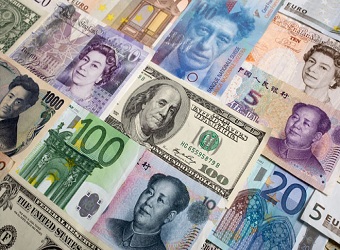Sterling steadied somewhat in Asian trade on Tuesday after weekend comments from British Prime Minister Theresa May sent it skidding to 2-1/2-month lows, while the dollar wallowed well below recent highs as the perceived safe-haven yen gained.
The pound edged up 0.1 percent to $1.2162, after sinking as low as $1.2125 on Monday, its weakest since Oct. 28, following May’s statement that she was not interested in keeping “bits of membership” of the European Union.
Her comments heightened fears about the impact of the UK’s exit from the European Union, as she said border controls would be prioritized over market access.
“Fears of a ‘hard Brexit’ have increased, and this has made investors more risk-averse,” said Kumiko Ishikawa, FX market analyst at Sony Financial Holdings.
That risk averse mood prompted market participants to lock in profits on the dollar’s gains and use it as an excuse to pare some of their long positions in the U.S. currency. It also benefited the perceived safe-haven yen.
The dollar was 0.3 percent lower against a basket of six major peers, at 101.60, pulling further away from last week’s high of 103.82, which was its highest level since 2002.
It skidded 0.6 percent to 115.365 yen, well below its overnight high of 117.53, though off an earlier session low of 115.20 yen as Tokyo traders returned to their desks after markets here were closed for a public holiday on Monday.
U.S. President-elect Donald Trump, who takes office on Jan. 20, is scheduled to hold his first news conference on Wednesday since winning the November election.
“Some Japanese customers are buying on dips with the dollar at the 115 level, but with Trump’s speech ahead, some people are taking profits and adjusting their positions,” said Kaneo Ogino, director at foreign exchange research firm Global-info Co in Tokyo.
“Overall, everyone will just jump on the bandwagon today, after the long weekend,” he said.
The euro gained 0.4 percent to $1.0617, moving away from last week’s 14-year low of $1.0340.
Expectations of higher U.S. interest rates underpinned the greenback. Boston Federal Reserve President Eric Rosengren on Monday called on the U.S. central bank to step up its pace of interest-rate increases from the once-a-year pattern it has pursued since 2015, warning of inflation risks if it does not.
At a separate event, Atlanta Fed President Dennis Lockhart said it was too early to judge how the incoming Trump administration, which has spoken of implementing fiscal stimulus, may change the path of the economy.
At its last meeting the Fed raised rates and indicated the tempo of increases may accelerate after Trump’s election promised a major spending plan and tax reform. Several policymakers have since said rates may have to rise faster during the Trump administration in order to check inflation.
Source: Reuters


